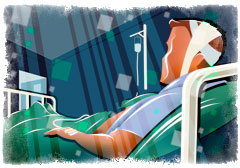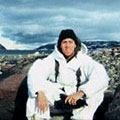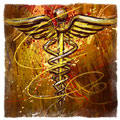|
|
||||
Sick in a Strange Land Imagine for a moment you're on a week-long business trip to a distant foreign country, and you’re starting to feel very sick. You’re running a temperature of 103, sweating and nauseous. Was it the Mongolian Boodog you ate last night, or something a lot more serious? Should you check into the sketchy-looking local clinic, or might the cure actually be worse than your disease? This is a not far-fetched situation where you really need to talk to a trusted medical advisor. Luckily, I met one such advisor recently: Chris Sidford MD, who graciously agreed to be interviewed for this article. VU: Dr. Sidford, let’s start with your background and your training.
VU: Tell me about Black Bag. CS: We start by understanding the risks traveling patients have due to their specific medical conditions. Then, if problems arise wherever our clients travel to, using the drugs and supplies we’ve provided them with or via remote support, we can either keep them on their trip, help to navigate local health care systems, or assist with medical evacuation. Patients contact us for everything from simple mishaps, like a twisted ankle, to extremely serious medical conditions — one of which was a heart attack in Aruba recently. Another was a cancer diagnosis in the Mediterranean. They needed to be evacuated back, so we helped them with those logistics. VU: What kind of folks use your services? Are they only upper echelon executives and high net worth clientele? CS: There are several different levels. At the high end, we serve very wealthy people who hire us for the year round. They're people who travel by private jet or have a number of homes around the world, and they want to be able to pick up the phone, dial one number, and talk to a trusted source that can give them advice and help in any of those locations. Preferably by a physician that knows them and their medical issues – that’s the ultimate relationship. Then there are a lot of people who hire us for a specific trip or event. We deal with many philanthropists who travel for their causes, for example to Ghana or Niger. We assist people who are booking a big trip of a lifetime, such as a multi-generational trip to Africa, and want to minimize their risk of developing medical problems. We also cover people like John Wood who founded the charity Room to Read and we donate services to him, and to Jane Aronson, the head of World Wide Orphans. We assist a variety of people. That circle extends out and we meet other people who are having a global impact. One group we work with is called Philanthropy Indaba. They take young kids from wealthy families around the world to show them the variety of things that they can make a difference with some of their wealth. VU: Are there situations where someone wants a doctor to accompany them on a trip to a remote or exotic location? CS: Yes. We work with some of the elite security teams who serve a high-end clientele. They are typically ex-British SAS, Secret Service, FBI, and CIA teams who used to be in those programs and now run private companies. They provide security to clients and then we are asked to come in and provide medical support. Or vice-versa. VU: How do people find out about Black Bag? Who typically refers you? CS: The security teams often do because they already have a close relationship with the client. Then there are family offices, high-end trust & estate attorneys, and philanthropy groups. Others come to us via word-of-mouth. VU: What types of travel and which destinations are "high risk" from a medical perspective? CS: The risk depends on where you’re going, what you’re planning on doing and what kind of existing medical problems you have. There are people who have an advanced illness and they will know, for example, that they’ll need transfusions on their around-the-world trip. Remoter treks to regions with extreme elevation such as Machu Picchu present a unique series of challenges. However, even nearby locations like the Caribbean may have unreliable medical facilities and can be surprisingly difficult to return from quickly. If you’re headed to places like Africa, there are certainly things you must be prepared for, like malaria and dengue fever. Nonetheless, probably 50% of the calls that we get are from people at home in the United States or in a U.S. medical facility. VU: Let's talk a little bit more about the overseas scenario, where someone might be sick or injured and must determine whether to seek local medical attention or be evacuated. That's something you would help determine and facilitate, correct?
VU: I’m sure just having the “black bag” provides great piece of mind... CS: True. However, it’s the easy access to emergency medical expertise and advice that seems to resonate with clients. VU: Could you list some general tips for folks who are traveling off the beaten path: what should they do before leaving and what should they bring? CS: If you have any kind of chronic medical condition, you should set up an appointment a couple weeks before you go; it's a good opportunity to have your medications adjusted if necessary. Certainly don’t ignore any new symptoms, which is tempting to do when you’re just focused on the trip. The second bit of important advice is to go see a travel doctor. For example, a recent survey found less than a third of the people headed to South America see a travel doc before they leave. There are a lot of subtleties regarding which type of malaria medications and immunizations are appropriate. People may think, “I don’t have to worry. I'm in a five star hotel or I'm at a resort.” Nonetheless, you still need to prepare. When you’re planning travel to underdeveloped areas, try to see a doctor two months before leaving. Immunizations for Hepatitis A, which is a common vaccination, takes two shots 6 weeks apart. VU: So how does one go about finding a travel doctor? Obviously, that's a referral that you could potentially make. DS: Exactly. We have a listing of travel physicians in each area of the country who specialize in that. Most of the big teaching facilities have dedicated travel medicine clinics. Also, ISTM, the International Society of Travel Medicine, has clinic listings on their website. Another bit of advice for travelers is to bring a hard copy of prescriptions and some extra prescription medications, in case your return is delayed. You recall what happened when the Icelandic volcano erupted. People were stranded when the airspace over 20 countries was closed for a week. VU: You and I met at a charity gala for World of Children. Which other charities do you support? CS: There are two others I’d like to mention. IMEC is a little organization with a big impact. They collect and donate medical supplies around the world. IMEC ships one 40 foot container a week to an area in need. And I mentioned Room to Read earlier. They’ve built 12,000 libraries around the world and do tremendous work. One of the nice discoveries of my business is all the great international organizations out there, doing wonderful things for people in need; I’m happy to support them. VU: Thank you for a terrific interview and for the great work you do.
NOTE: Dr. Sidford has provided a downloadable PDF with tips on preparing for international travel. For more information, you can reach him at 978-518-3203 or through the Black Bag web site.
|




